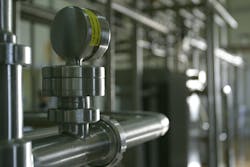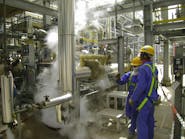Application Corner: Less expensive materials can be superior
Specifying exotic materials of construction, such as tantalum, zirconium, Monel or Hastelloy, in an instrument can increase its cost and time-of-delivery significantly. As such, exotic materials of construction are generally perceived to be superior to standard materials and, by inference, instruments that incorporate them are perceived to be superior. This provides an incentive for manufacturers to incorporate superior materials into their standard instruments when economically viable, such as when small amounts of exotic metals are involved.
For example, instruments are typically offered with 316L stainless steel construction as standard because 316L stainless steel has superior corrosion resistance than less expensive 304L stainless steel. Offering 304L standard construction as standard would infer an inferior instrument, unless the instrument contained a large amount of metal, such as a large positive displacement flowmeter. Similarly, pressure and differential pressure transmitters are often offered with Hastelloy diaphragms as standard because it has better chemical resistance than 316L stainless steel and only small amounts of metal are required.
However, using what appear to be better materials of construction can cause problems in some applications. In some processes, 304L stainless steel is acceptable but 316L stainless steel is not. Identifying where 316L is not acceptable is often not apparent because less expensive 304L pipe is usually used when both 304L and 316L are acceptable. As such, it might be advisable to consult with the process engineer to identify when only 304L is acceptable.
Hastelloy diaphragms in pressure transmitters are relatively thin and can allow hydrogen molecules to pass through to the sensor. This can cause the transmitter to fail, even in seemingly innocuous water-based applications. On the other hand, 316L stainless steel does not allow hydrogen molecules to pass through at pressures below approximately 10 bar.
Therefore, the idiosyncrasies of the process at hand need to be considered before one can conclude that superior materials incorporated into instruments are truly superior.
David W. Spitzer has written over 500 technical articles and 10 books on flow measurement, instrumentation, process control and variable speed drives. David offers consulting services, writes/edits white papers, presents seminars and provides expert witness services at Spitzer and Boyes LLC (spitzerandboyes.com or +1.845.623.1830).
David W. Spitzer
David W Spitzer’s new book Global Climate Change: A Clear Explanation and Pathway to Mitigation (Amazon.com) adds to his over 500 technical articles and 10 books on flow measurement, instrumentation, process control and variable speed drives. David offers consulting services and keynote speeches, writes/edits white papers, presents seminars, and provides expert witness services at Spitzer and Boyes LLC (spitzerandboyes.com or +1.845.623.1830).


